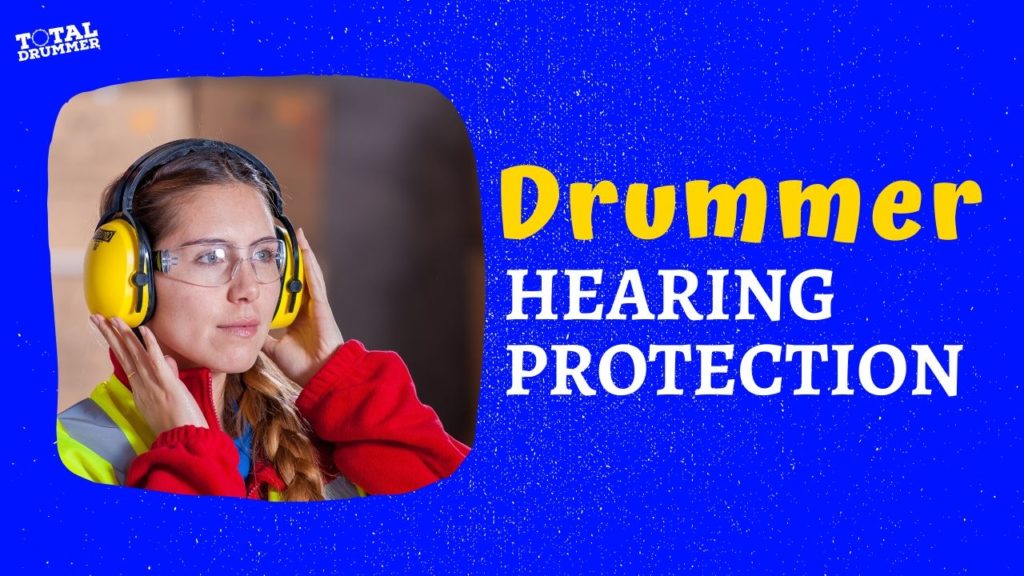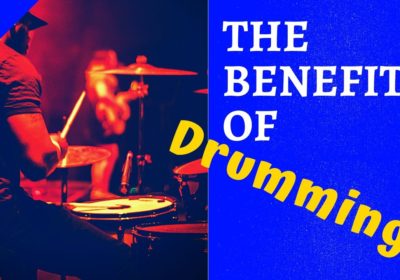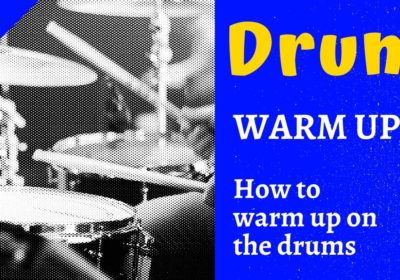DRUMMER HEARING PROTECTION
How to protect your hearing
Deriving from the Latin word ‘Ringing’, tinnitus is a condition that affects our hearing and can become so severe that musicians can no longer play their instruments. For this reason alone drummer hearing protection is essential for a long, happy musical life.
This article explains what tinnitus is, how it is caused, and how to prevent it as a drummer,
WHAT IS TINNITUS?
The human ear is a remarkable instrument consisting of the outer ear, middle ear and inner ear. Between these three components, the ear can take the sound waves that it catches and turn them into electrical signals that the brain can compute as sound. Unfortunately this incredible organ can be damaged by the very thing that it is designed to detect.
Many of us have experienced temporary tinnitus after a concert, detected as a ringing in the ears that disappears by the following morning. If this noise exposure continues then permanent damage can occur.
One symptom is the damage of the tiny hair cells in the inner ear resulting in the loss of hearing of certain frequencies. This can occur in the frequencies of human speech, meaning that hearing parts of a conversation become difficult.
A second symptom of noise exposure is tinnitus. This is caused by the damaged hair cells transmitting a new signal to the brain. If this new signal is perceived by the brain as a sound, then a constant sound will be experienced inside the sufferer’s head, often in the form of a high pitched ringing or buzzing.
According to the BTA (British Tinnitus Association), “Mild tinnitus is common ‑ about 10 per cent of the UK adult population have it all the time and, in up to one per cent of adults, this may affect their quality of life.”
Obviously, as drummers, we stand a greater chance of being in that one percent due to the fact that we smack things with bits of wood to create loud noises. Add to this, the environments of noisy gigs, deafening rehearsal rooms, and guitarists who think that Spinal Tap’s guitar amp volume 11 is actually a good idea, and we have a real need to take action before permanent damage is caused.
WHAT IS TOO LOUD?
When working out if your environment is too noisy, the BTA says, “There are two easy ways to do this: If you are exposed to noise that afterwards leaves you with ringing in the ears then it is too loud. This ringing in your ears (technically this is tinnitus) represents a condition called temporary threshold shift and indicates that your hair cells are exhausted from too much noise.”
The second way is whether you can hold a conversation or not. A rough guide for background noise levels depending on ability to talk is shown below:
- Loud Voice at 4ft – 93dB
- Shout at 4ft – 99dB
- Shout at 2 ft -105dB
- Impossible even close to listener’s ear – Over 110dB
The theory says that for every 3dB increase in sound intensity, the safe time of exposure to that sound halves!”
This means that as 85db are considered safe for a full working day (8 hours), then the decibel increase and safe exposure time would look like this:
85db – 8hrs
88db – 4hrs
91db – 2hrs
94db – 1hr
97db – 30mins
100db – 15mins
103db – 7.5mins
106db – 3.75mins
CURE
There is currently not a cure for tinnitus so once the damage is done, it is here to stay.
PREVENTION
Eddy Temple-Morris, BTA Ambassador, DJ, Producer and Presenter says, “If you are an employed musician, the Control of Noise at Work Regulations (2005) made employers responsible for the assessment, management and reduction of noise in the workplace, including the provision, where appropriate, of suitable hearing protection. So any “employed” musician should now have access to advice, suitable hearing protection and/or other forms of noise reduction.”
That is all well and good, but many of us are freelance or amateur drummers without the luxury of someone looking out for our health. Therefore the responsibility lies with you.
Here are some tips for using good drummer hearing protection and therefore preventing hearing damage:
- The best method of prevention would be to avoid noisy situations but as a drummer that just isn’t an option.
- A more practical alternative is to limit your exposure time. During a rehearsal session, incorporate breaks in which you find somewhere quiet to rest your ears. During a gig, use the intermission to find a quiet space and rest those ears. When recording, between takes find somewhere quiet and rest your ears.
- Stay hydrated to maintain inner ear function, and avoid alcohol as this affects the fluids in the inner ear.
- Turn down. This will not always be possible but you might want to consider whether the rehearsal really needs to be carried out at high volume. Often by turning down, you will find greater clarity in sound and the music might actually feel better, enabling band members to bounce off each other and create better music. A double whammy!
- Wear hearing protection. The stigma of ear plugs not being ‘cool’ is finally fading as people start to realise that loss of hearing and tinnitus is even less cool. Most professional musicians use hearing protection now and a huge range of products exist on the market.
RANGE OF HEARING PROTECTION PRODUCTS
You might want to find out what the best headphones for drummers are when protecting your ears
When it comes to ear plugs, most drummers hate them. They are often uncomfortable and cut out too much of certain frequencies and not enough of others resulting in a muffled, unpleasant sound that sees us ripping them out half way through the first song. But if you invest your money to buy a suitable pair, you will find a product that protects your ears and allows you to enjoy your music.
Products range from cheap disposable foam plugs for £1, mouldable silicone plugs at around £3, plastic ear plugs around £6, shooting muffs around £20, stereo isolation headphones around £60, custom moulded ear plugs for around £100, and up to in ear monitors (IEM) for around £200.
Interestingly, us drummers will very happily part with £200 for a Zildjian K dark crash cymbal but begrudge having to spend even £20 on hearing protection. But for all the enjoyment we can get out of our favourite drums and cymbals, they are nothing without a good pair of ears through which we can actually hear the drums and cymbals.
Our ears are our greatest instrument and spending money on keeping them maintained is one of the greatest investments you can make as a musician.
Obviously, it depends upon your application as to what you buy. Shooting ear muffs might have a great db reduction that work for practising in your bedroom, but might not look as cool on stage as a discreet set of custom moulded ear plugs.
If you play live and want the on stage monitor sound to come direct into your ear at a safe volume, then the IEMs would be a great choice. The custom fit means that they shut out much of the sound outside so you have complete control over the volume that reaches your ear through the monitors.
Whatever you choose, by taking these steps to protect your ears, you will be able to go on enjoying music up to a ripe old age.
FURTHER INFORMATION
A great resource www.tinnitus.org.uk
A good source of information for musicians is the US charity HEAR (Hearing Education and Awareness for Rockers): www.hearnet.com
This website has many practical tips for musicians: www.soundadvice.info/
Faster Hands in 7 Days FREE Drum Course
Improve your drum hand speed in a week to get Faster Hands
We all want faster hands on the drums but so many drummers I see are missing the basic aspects of drumming that will take them to the next level.
Many of those drummers are not lazy. In fact it's the opposite. They are putting in the work but they are missing the fundamental techniques that will allow them to play faster and smoother. This leads to inevitable frustration and despondency.
In effect they are wasting their time!
By clicking below you can gain access to a FREE '7 days to faster hands' drum course that will guarantee to raise your speed by the end or your money back (yes it is free so not the best guarantee ever!). But seriously, it will make a difference in a really short space of time.
But more than trying to create unrealistic miracles in a short space of time, it will also set up long term habits that will help you find your full potential as a drummer long into the future. And that is way more important.
It will show you:
- The fundamental techniques to play at your best level
- How to properly grip the sticks
- How to prepare yourself properly to drum
- How to make the stick do the work so you don't have to
- How to set your drums up for optimum speed
- How to apply this around the kit
- Exercises to develop control as well as speed
- How to take this on into the future to become awesome!
And more than that you will also get a ton of other great free drum resources to make you a better drummer such as playalong tracks, articles, exclusive video lessons and more. And it's all free!
Watch the video to get a feel for what the seven day course entails and then scroll down to get the course immediately.
Start today and build your hand speed up
So let's start the course today. Do it now and begin your 7 day process to get faster hands. This time next week you'll be enjoying the results and thinking about how you can take it to the next stage (by the way, the course helps with that too as we'll be checking speed progress over the next 12 months).
So click the big blue button below. Let's get started!

FREE Timing Course
By clicking below you can gain access to a FREE ‘Drummer Timing 101’ drum course that will give you the knowledge, tools and exercises that you need to quickly get your timing up to the level it needs to be.
It will provide:
- The two main types of timing to master
- MP3 backing tracks to practice with and develop great timing
- Full sheet music for all exercises
- Video demonstrations of every exercise
And more than that you will also get a ton of other great free drum resources to make you a better drummer such as playalong tracks, articles, exclusive video lessons and more. And it’s all free!
Watch the video to get a feel for what the drummer timing 101 course entails and then scroll down to get the course immediately.
Start today and develop perfect timing
So let’s start the course today. Do it now and begin your drummer timing 101 course and start developing perfect timing. It won’t happen instantly but if you follow the lessons in the course you will start to feel the change very quickly.
If at any time you’re not digging the content, simply unsubscribe. There’s nothing to lose and your details won’t be shared with anyone, nor will you be bombarded with sales type emails. Just great free drum content that I hope provides real value for you.



Hi Matt
Thanks very much for the very useful and informed article about this much overlooked and neglected subject about noise and its manifestations for our hearing.
As drummers we’re very much front line for developing hearing problems, including tinnitus, unless we equip ourselves with quality hearing protection from the outset. The high frequencies associated cymbals esp crash cymbals, are probably the worst culprits with lead guitarists a close second. So yes take note of the advice given and get hold of moulded ear plugs eg. Elacin Hearing Protection or the ultimate in hearing protection, in-ear sound monitors. Don’t leave it too late like I did – tinnitus ain’t fun I can assure you !
Cheers and keep up the good work
Best wishes
Graham
Hey Graham, Thanks for your input. Yes it’s so important isn’t it. Luckily I feel that the stigma of hearing protection ‘not being cool’ is sliding away as people realise that tinnitus is a worse option. When I was a kid I used to rock out next to guitar amps turned up to 11 and with nothing protecting me ears. Makes me cringe thinking about it now!